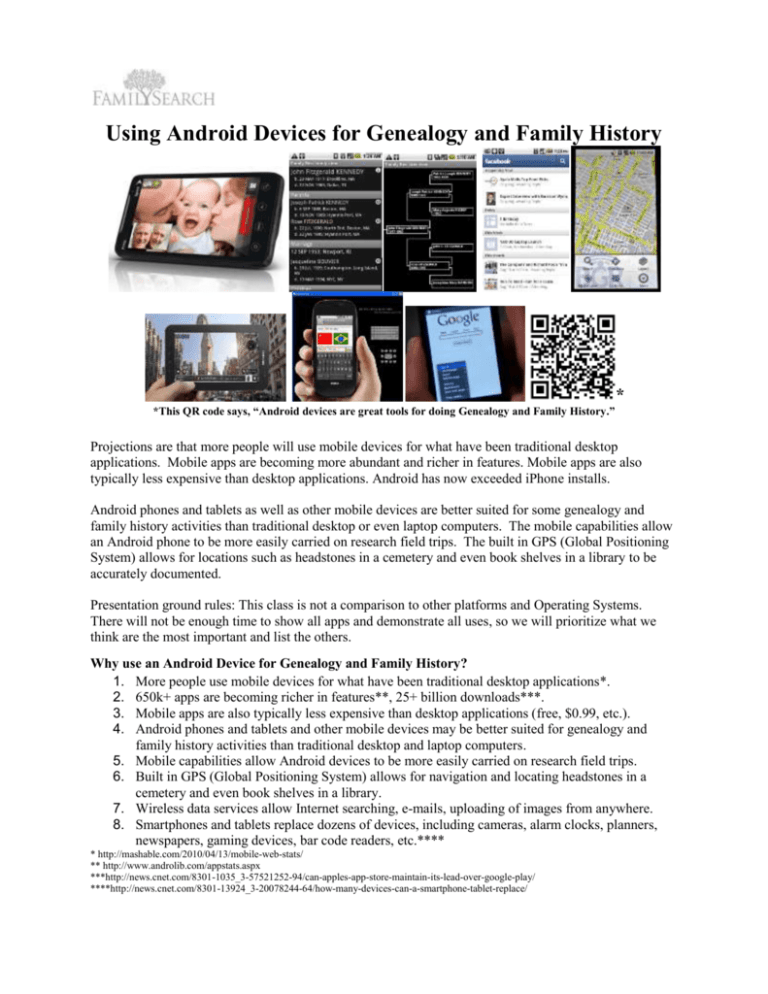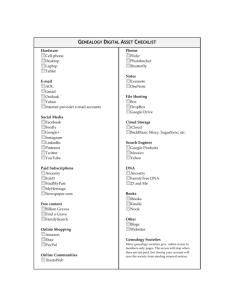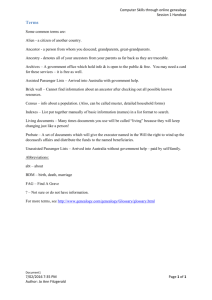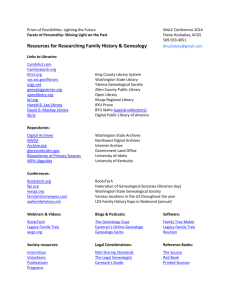
Using Android Devices for Genealogy and Family History
*
*This QR code says, “Android devices are great tools for doing Genealogy and Family History.”
Projections are that more people will use mobile devices for what have been traditional desktop
applications. Mobile apps are becoming more abundant and richer in features. Mobile apps are also
typically less expensive than desktop applications. Android has now exceeded iPhone installs.
Android phones and tablets as well as other mobile devices are better suited for some genealogy and
family history activities than traditional desktop or even laptop computers. The mobile capabilities allow
an Android phone to be more easily carried on research field trips. The built in GPS (Global Positioning
System) allows for locations such as headstones in a cemetery and even book shelves in a library to be
accurately documented.
Presentation ground rules: This class is not a comparison to other platforms and Operating Systems.
There will not be enough time to show all apps and demonstrate all uses, so we will prioritize what we
think are the most important and list the others.
Why use an Android Device for Genealogy and Family History?
1. More people use mobile devices for what have been traditional desktop applications*.
2. 650k+ apps are becoming richer in features**, 25+ billion downloads***.
3. Mobile apps are also typically less expensive than desktop applications (free, $0.99, etc.).
4. Android phones and tablets and other mobile devices may be better suited for genealogy and
family history activities than traditional desktop and laptop computers.
5. Mobile capabilities allow Android devices to be more easily carried on research field trips.
6. Built in GPS (Global Positioning System) allows for navigation and locating headstones in a
cemetery and even book shelves in a library.
7. Wireless data services allow Internet searching, e-mails, uploading of images from anywhere.
8. Smartphones and tablets replace dozens of devices, including cameras, alarm clocks, planners,
newspapers, gaming devices, bar code readers, etc.****
* http://mashable.com/2010/04/13/mobile-web-stats/
** http://www.androlib.com/appstats.aspx
***http://news.cnet.com/8301-1035_3-57521252-94/can-apples-app-store-maintain-its-lead-over-google-play/
****http://news.cnet.com/8301-13924_3-20078244-64/how-many-devices-can-a-smartphone-tablet-replace/
Top Genealogy Apps
Based on Popularity in the Google Play store
1.
Ancestry, Ancestry.com
Build, update, and show off your family tree with the Ancestry.com app. Whether you're a
beginner or an expert, this user-friendly app makes finding and learning easy
2.
Family History Media, AppTime
The Android phone provides a great opportunity to capture family history before it is
gone. Use the Family History Media app in-conjunction with the online solution
3.
Families, TelGen Limited, $14.99 Buy
Display and edit your Legacy family trees on your Android device. Families is designed to
operate in conjunction with Legacy Family Tree, the leading Windows-based genealogy
program
4.
MyHeritage, MyHeritage.com
MyHeritage app for Android - share family moments, discover and edit your family history
and keep in touch with the people you love anytime, anywhere.
5.
Family Bee, Beekeeper Labs, $10.00 Buy
Grandpa on the Go. Family Bee is an industrial strength family tree viewer. It allows
viewing of all details for individuals and families in GEDCOM genealogy files.
6.
Family Tree, LiveFamily
Family Tree is a great way to keep in touch with your family. * FIXED * - The Confirm
button wasnt working under some situations.
7.
My Heritage, Piod Song
Manage your family and friends information as well as relationships. Manage your family
and friends information as well as relationships.
Using Android Devices for Genealogy and Family History–
Mobile Research Example
Michael C. Helmantoler, Family History Researcher, BA, MA, CBCP
Family history researchers need to know how to use an Internet connected tablet computer. This
session will focus on Android applications that facilitate genealogy field research.
Mobile tablet computers enable family history research as a passenger in your car. The
navigation tool will direct you to your research destination without a map. As you travel, you can
review your research plan on the file manager. If you are inspired to check out a historical site,
you can search for details with Google before you arrive.
A TOOL TO MAXIMIZE ON-SITE RESEARCH
In the summer of 2011, we used a Samsung Galaxy 7” Nextel Tablet on two 30-day cross-country family
history research trips in the Mid-South region of the USA. We visited libraries, courthouses, and
cemeteries in over 30 counties in the states of WY, NE, MO, IL, KY, TN, VA, MD, DC, and PA. We
used ten different Android applications for recording, reviewing, and communicating research results.
We chose to travel the routes our ancestors used and visit the little country churches and stores along the
way. We planned the trip using location reports from Legacy Family Tree software. They showed each
person by state, county and town. They also carried hard copy paper research calendars for the questions
we were researching and the records we needed at each location.
When we discovered new clues and recommended alternate locations, we used the Internet browser to
check the Family History Library Catalog to see what records were available in that location. We used a
word processor to cut and paste the information from the browser into a research calendar. We used the
voice recorder when taking notes in the library stacks. We used the camera to capture images from the
microfilm reader. We used the scanner application to capture pages in to PDF files.
BENEFITS OF USING TABLET APPLICATIONS
The Android Tablet applications facilitated mobile research by:
1. Accessing Google Maps and navigating with verbal driving directions.
2. Providing DropBox.com access to research notes on a computer at home.
3. Checking dates, places, and names in a family group sheet view of data.
4. Running a genealogy application to view pedigree charts for relationships.
5. Viewing chronology reports to check event locations.
6. Being a camera to capture pages in books, manuscripts, and microfilm images.
7. Being a physical keyboard for updating research calendars and research logs.
BRIDGING THE GENEALOGY GENERATION GAP
Mobile tablet computers help carry on your family history work to younger generations. With their own
copy of their genealogy on a tablet, they can do “social networking for the dead.” They love having the
data in a “cool” device rather than file cabinets and binders.
THE NEXT STEPS FOR YOU
How can you get started with tablet computing?
1. Import your GEDCOM data into a genealogy application.
2. Get research notes into software.
3. Create research calendars.
4. Create digital research logs.
5. Document your assertions with sources.
David Lifferth
Genealogy, Technologist, Business Analyst
LifferthD@FamilySearch.org
© 2013 FamilySearch International. All rights reserved. No part of this document may be reprinted or reproduced in any form for
any purpose without prior written permission.





